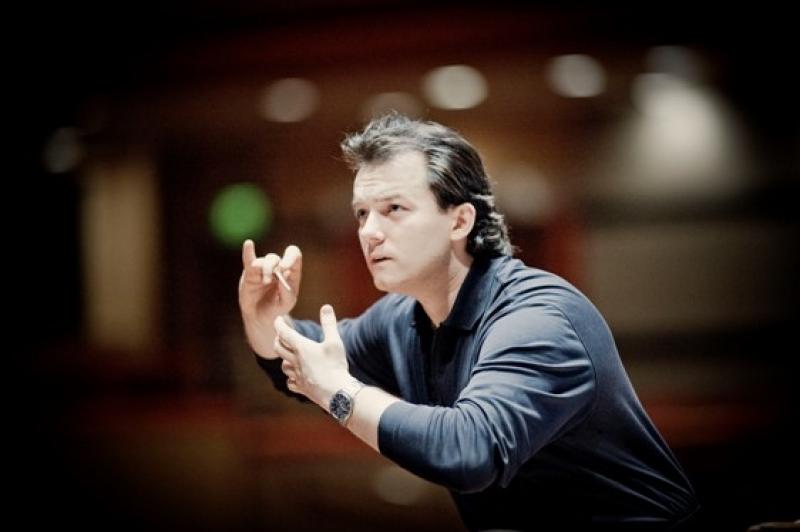CBSO, Nelsons, Symphony Hall, Birmingham | reviews, news & interviews
CBSO, Nelsons, Symphony Hall, Birmingham
CBSO, Nelsons, Symphony Hall, Birmingham
Mahler's last completed masterpiece almost too exciting
Thursday, 03 February 2011

Andris Nelsons: Highly gestural but everything comes from the score
Mahler cycles in his centenary year are about as predictable as dead leaves in autumn. But they perhaps belong more in Birmingham than in some other cities. Mahler, after all, was a big factor in making Simon Rattle’s name, and Rattle was a big factor in getting this superb concert-hall built. So the current cycle there, now halfway through, is like a civic statue to the Master: a tribute both ways, honour to the giver and the receiver.
Mahler cycles in his centenary year are about as predictable as dead leaves in autumn. But they perhaps belong more in Birmingham than in some other cities. Mahler, after all, was a big factor in making Simon Rattle’s name, and Rattle was a big factor in getting this superb concert-hall built. So the current cycle there, now halfway through, is like a civic statue to the Master: a tribute both ways, honour to the giver and the receiver.
Add comment
The future of Arts Journalism
You can stop theartsdesk.com closing!
We urgently need financing to survive. Our fundraising drive has thus far raised £49,000 but we need to reach £100,000 or we will be forced to close. Please contribute here: https://gofund.me/c3f6033d
And if you can forward this information to anyone who might assist, we’d be grateful.

Subscribe to theartsdesk.com
Thank you for continuing to read our work on theartsdesk.com. For unlimited access to every article in its entirety, including our archive of more than 15,000 pieces, we're asking for £5 per month or £40 per year. We feel it's a very good deal, and hope you do too.
To take a subscription now simply click here.
And if you're looking for that extra gift for a friend or family member, why not treat them to a theartsdesk.com gift subscription?
more Classical music
 Budapest Festival Orchestra, Iván Fischer, Edinburgh International Festival 2025 review - mania and menuets
The Hungarians bring dance music to Edinburgh, but Fischer’s pastiche falls flat
Budapest Festival Orchestra, Iván Fischer, Edinburgh International Festival 2025 review - mania and menuets
The Hungarians bring dance music to Edinburgh, but Fischer’s pastiche falls flat
 Classical CDs: Hamlet, harps and haiku
Epic romantic symphonies, unaccompanied choral music and a bold string quartet's response to rising sea levels
Classical CDs: Hamlet, harps and haiku
Epic romantic symphonies, unaccompanied choral music and a bold string quartet's response to rising sea levels
 Kolesnikov, Tsoy / Liu, NCPA Orchestra, Chung, Edinburgh International Festival 2025 review - transfigured playing and heavenly desire
Three star pianists work wonders, and an orchestra dazzles, at least on the surface
Kolesnikov, Tsoy / Liu, NCPA Orchestra, Chung, Edinburgh International Festival 2025 review - transfigured playing and heavenly desire
Three star pianists work wonders, and an orchestra dazzles, at least on the surface
 BBC Proms: Láng, Cser, Budapest Festival Orchestra, Iván Fischer review - idiomatic inflections
Bartók’s heart of darkness follows Beethoven’s dancing light
BBC Proms: Láng, Cser, Budapest Festival Orchestra, Iván Fischer review - idiomatic inflections
Bartók’s heart of darkness follows Beethoven’s dancing light
 Weilerstein, NYO2, Payare / Dueñas, Malofeev, Edinburgh International Festival 2025 review - youthful energy and emotional intensity
Big-boned Prokofiev and Shostakovich, cacophonous López, plus intense violin/piano duo
Weilerstein, NYO2, Payare / Dueñas, Malofeev, Edinburgh International Festival 2025 review - youthful energy and emotional intensity
Big-boned Prokofiev and Shostakovich, cacophonous López, plus intense violin/piano duo
 theartsdesk at the Three Choirs Festival - Passion in the Cathedral
Cantatas new and old, slate quarries to Calvary
theartsdesk at the Three Choirs Festival - Passion in the Cathedral
Cantatas new and old, slate quarries to Calvary
 BBC Proms: Estonian Philharmonic Chamber Choir, Kaljuste review - Arvo Pärt 90th birthday tribute
Stillness and contemplation characterise this well sung late-nighter
BBC Proms: Estonian Philharmonic Chamber Choir, Kaljuste review - Arvo Pärt 90th birthday tribute
Stillness and contemplation characterise this well sung late-nighter
 BBC Proms: Kholodenko, BBCNOW, Otaka review - exhilarating Lutosławski, underwhelming Rachmaninov
Polish composers to the fore in veteran conductor’s farewell
BBC Proms: Kholodenko, BBCNOW, Otaka review - exhilarating Lutosławski, underwhelming Rachmaninov
Polish composers to the fore in veteran conductor’s farewell
 theartsdesk at the Pärnu Music Festival 2025 - Arvo Pärt at 90 flanked by lightness and warmth
Paavo Järvi’s Estonian Festival Orchestra still casts its familiar spell
theartsdesk at the Pärnu Music Festival 2025 - Arvo Pärt at 90 flanked by lightness and warmth
Paavo Järvi’s Estonian Festival Orchestra still casts its familiar spell
 BBC Proms: Batsashvili, BBC Scottish Symphony Orchestra, Ryan Wigglesworth review - grief and glory
Subdued Mozart yields to blazing Bruckner
BBC Proms: Batsashvili, BBC Scottish Symphony Orchestra, Ryan Wigglesworth review - grief and glory
Subdued Mozart yields to blazing Bruckner
 Classical CDs: Hens, Hamburg and handmaids
An unsung French conductor boxed up, plus Argentinian string quartets and baroque keyboard music
Classical CDs: Hens, Hamburg and handmaids
An unsung French conductor boxed up, plus Argentinian string quartets and baroque keyboard music
 BBC Proms: McCarthy, Bournemouth SO, Wigglesworth review - spring-heeled variety
A Ravel concerto and a Walton symphony with depth but huge entertainment value
BBC Proms: McCarthy, Bournemouth SO, Wigglesworth review - spring-heeled variety
A Ravel concerto and a Walton symphony with depth but huge entertainment value

Comments
...
...
...